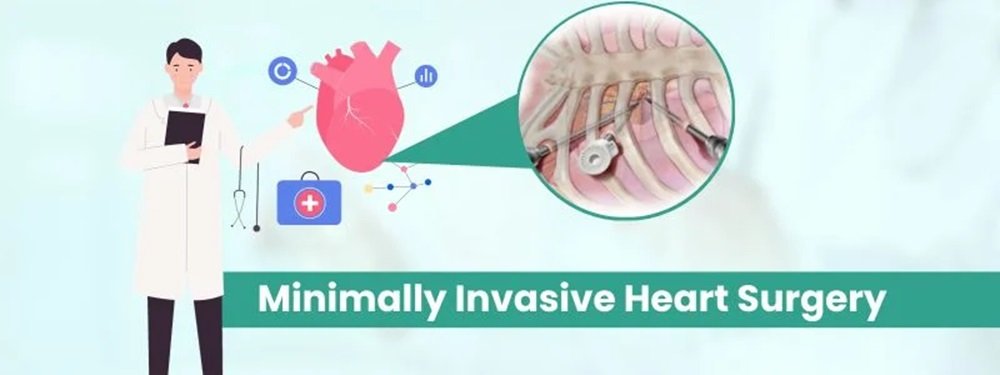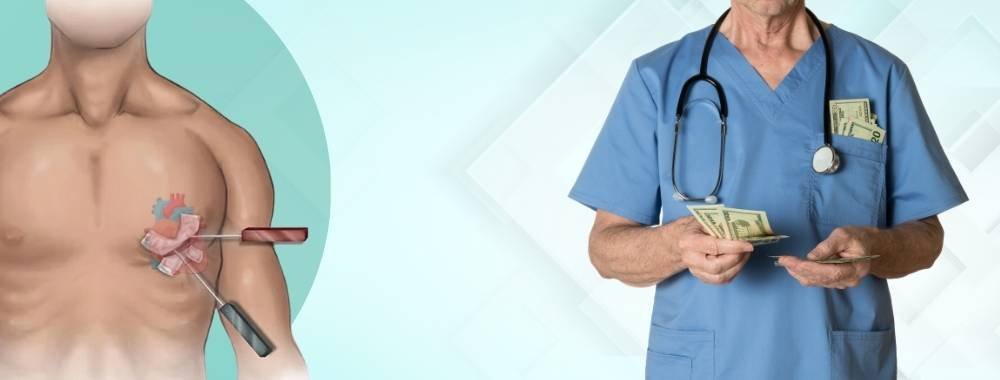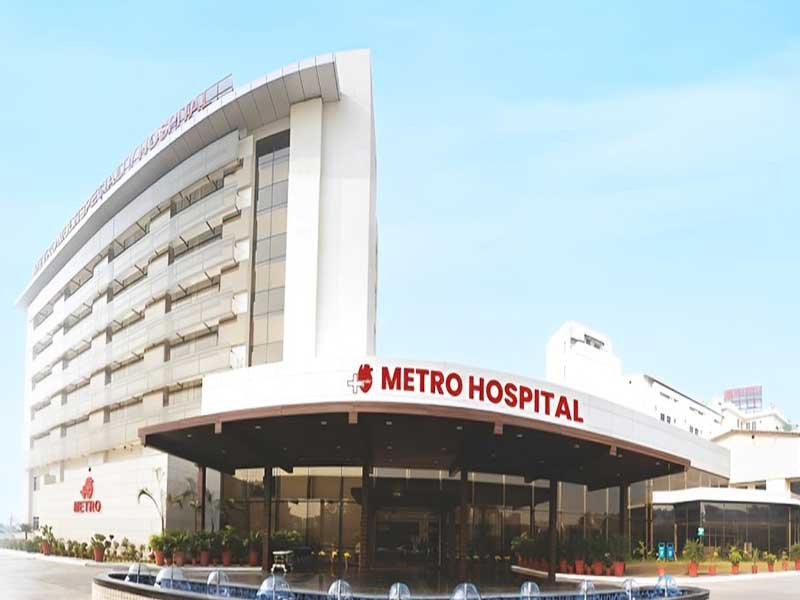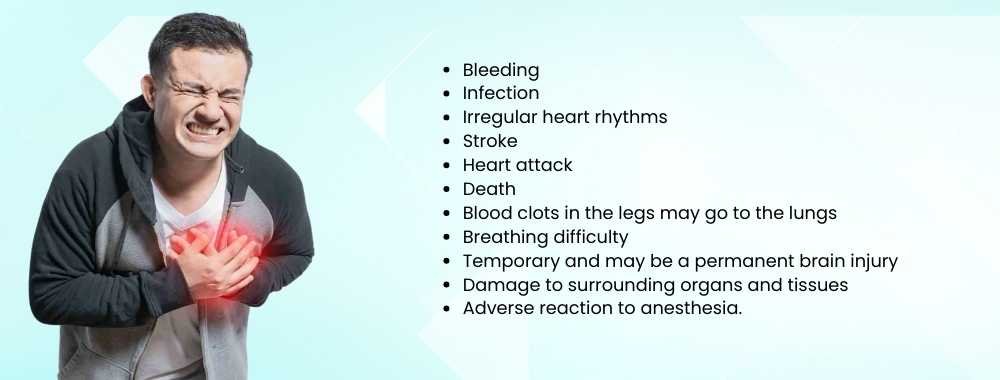Minimally invasive heart surgery in India is right choice for you if you are looking for affordable treatment without compromizing the quality of care.
Recovery Time
2 Weeks
Success Rate
95%
Hospital Stay
7 Days
Treatment Type
Surgical
Home Treatments Cardiac Surgery Minimally Invasive Heart Surgery
Are you seeking affordable, advanced options, and high-quality care for minimally invasive heart surgery?
This type of heart surgery uses small incisions instead of one large cut. Surgeons use small, powerful cameras, special tools, and robotic arms. These are inserted along small cuts between your ribs, allowing the surgeon to reach the heart without opening your chest. This method has various benefits, like smaller scars, less pain, and a quicker recovery compared to open-heart surgery.
Get the care you deserve, act now!
India provides affordable surgical options for international patients seeking minimally invasive heart surgery with highly experienced cardiac surgeons. They offer advanced options for robotic-assisted heart surgery, and thoracoscopic surgery including high-quality care to support patients.

A lot of heart procedures may be done with minimally invasive heart surgery including:
Minimally invasive heart surgery costs usually include surgical fees, hospital charges, operating room, nursing care, diagnostic tests, medications, rehabilitation after surgery, and follow-up appointments.
Cost Component | Details | Estimated Cost in USD |
Pre-operative Consultation & Diagnosis | Consultations, X-rays, MRI scans, blood tests. | 400 USD |
Surgery Costs | This includes surgeon fees, surgery type, and hospital stay. | 9500 USD |
Rehabilitation and Follow-up | Physiotherapy sessions, medications, supportive devices, follow-up visits. |
Thoracoscopic surgery
Robotic Assisted Heart Surgery
Robotic heart surgery can be used for many heart problems which include:

Pre-operative tests
Hospital charges
Surgeon's expertise
Type of Surgery
Complications
Post-operative Care
Additional Expenses
Country | Cost Structure |
India | 9500 USD |
United States | 40000-80000 USD |
Germany | 18000-40000 USD |
Turkey | 10000-15000 USD |
◾Key Takeaways
✅ Affordable Surgery Costs: India delivers affordable treatment options with highly skilled surgeons. Advanced facilities, making quality healthcare in India available to international patients.
✅ Advanced Medical Technology: Hospitals in India are equipped with advanced technology and have modern infrastructure and high-quality care providing international standards at more affordable costs.
Minimally Invasive Heart Surgery cost
Treatment Name
Estimated Cost
Minimally Invasive Heart Surgery 9500 USD
India has highly skilled cardiac surgeons who perform minimally invasive heart surgery and effective treatments to help patients with advanced techniques and specialized care.
Beds: 539
New Delhi
Beds: 230
New Delhi
Beds: 710
New Delhi
Beds: 650
New Delhi
Beds: 191
New Delhi
Beds: 310
New Delhi
Beds: 299
Gurugram
Beds: 380
New Delhi
Beds: 402
New Delhi
Beds: 1300+
Gurugram
Beds: 1000
New Delhi
Beds: 450
Faridabad
Beds: 675
New Delhi
Beds: 500
New Delhi
Beds: 400+
Faridabad

Max Super Speciality Hospital, Saket

Aakash Healthcare Super Speciality Hospital

Indraprastha Apollo Hospital

BLK Max Super Speciality Hospital

Dharamshila Narayana Superspeciality Hospital

Fortis Escorts Heart Institute

Fortis Memorial Research Institute

Manipal Hospital Dwarka

Max Super Speciality Hospital Shalimar Bagh

Medanta - The Medicity Hospital

Moolchand Kharaiti Ram Hospital

Sarvodaya Hospital

Sir Ganga Ram Hospital

Venkateshwar Hospital

Metro Heart Institute with Multispecialty
Indian hospitals offer advanced technology and high-quality care. They provide effective treatment and support recovery based on each patient’s needs.
Necessary diagnostic tests
Before surgery, you may need to undergo several tests to assess your overall health. Common tests include:
Tests | Description |
Electrocardiogram (EKG) | This test records your heart's electrical activity to help examine any irregularities. |
Echocardiogram | This imaging test creates a moving picture of your heart, size, shape, and how well it functions. |
Exercise Stress Test | During this test, your surgeon monitors your heart activity, blood pressure, and other vital signs while you increase your heart rate by walking on a treadmill. |
Cardiac Catheterization (Angiogram) | It involves a thin tube that can be inserted into a blood vessel and threaded into your heart and it also helps to see how blood flows. |
Blood Tests | It helps to check levels of white blood and red blood cells, cholesterol, blood sugar, and many important indicators of health. |
Chest X-ray | This test can tell if the heart is larger than usual and if there is fluid around the lungs. |
Cardiac MRI | It uses magnetic fields and radio waves to create detailed images of the heart and help examine the extremity of heart valve problems. |
Arterial mapping | It is an ultrasound scan that creates detailed pictures of radial arteries in your forearm that can be used as bypass grafts. |
🟢Do’s Before Surgery
✅ Make sure to follow your doctor’s advice on when to stop eating and drinking, and which medicines to take and avoid before surgery.
✅ Eating a healthy and balanced diet will help you stay strong and fight against infection.
✅ Drink plenty of water because it is important to help you prevent side effects.
✅ Take a shower the night before surgery using an antiseptic soap and any special soap your doctor recommends. It helps remove bacteria and reduce the chance of infection.
🔴Don’ts Before Surgery
❌ Stop drinking alcohol, and drugs before your surgery because it can interfere with the anesthesia and affect your recovery.
❌ Quit smoking because it can increase the risk of blood clots and other heart problems during and after the surgery.
❌ Don’t take blood thinners and anti-inflammatory medicines, as these can increase the risk of bleeding during the surgery. Make sure to check with your doctor on when to stop these medications.
❌ You do not wear contact lenses, dentures, Jewelry, and nail polish.
❌ Do not use any perfume, body sprays, and hairspray as well.
Here is the procedure of how the minimally invasive heart surgery is performed:
Before the Procedure
During the Procedure
After the Procedure
After this, you might be shifted to a general hospital room.
Here are the list of benefits of minimally invasive heart surgery such as:
Hospital Stay and Recovery Time
Patients need to stay in the hospital for 7 days however, the full recovery takes 2 weeks.
The success rate of minimally invasive heart surgery is 95%.

Complications of minimally invasive heart surgery are generally lesser including:
Why Choose Mejocare for Minimally Invasive Heart Surgery in India?
✅ Team of Top Cardiac Surgeons, and Cardiologists: Our recommended doctors have over 20 years of experience in minimally invasive heart surgery and other cardiac procedures, including ICD implantation, balloon angioplasty, and pacemaker implantation. This experience ensures that you are in expert hands, receiving high-quality care for your heart health requirements.
✅ JCI/NABH Accredited Hospitals: Mejocare partners with hospitals that are accredited by JCI and NABH. These hospitals feature advanced facilities and the latest technologies, such as robotics, machine learning, and advanced diagnostic and therapeutic equipment, providing comprehensive and personalized care.
✅ Other Benefits: We provide quick, detailed responses, accurate cost estimates, and assistance with obtaining medical visas, as well as accommodation arrangements in India. Moreover, we organize your appointment scheduling and provide smooth and easy arrival services, airport pickup, hotel transfers, and full support during your hospital stay.
Minimally invasive heart surgery is a valuable option for treating various heart conditions. It offers many benefits over traditional open-heart surgery, including it generally, results in less pain and discomfort for patients, faster recovery, small cuts, shorter hospital stay, and better outcomes. There is a reduced risk of bleeding during and after the procedure as well as infection as compared to open-heart surgery.
Disclaimer
Information given in this article is only for general purposes it doesn’t mean to provide an accurate cost estimate. If you are seeking professional opinions and exact cost information we can help you to join India’s top surgeons. Contact Mejocare now.

Medically Reviewed By
Dr. Aryan Malhotra is a highly respected and compassionate medical professional with a strong academic background. He holds an MBBS and MD degree from DTMU University in Georgia. Driven by a deep sense of duty, he is dedicated to providing exceptional care to his patients.
The average cost of minimally invasive heart surgery in India is 9500 USD.
The success rate of Minimally invasive heart surgery in India is around 95%.
After minimally invasive heart surgery, you will normally have to stay in the intensive care unit (ICU) for 1-2 days
The recovery time for minimally invasive heart surgery in India is typically 6 to 8 weeks.
The 30-day overall mortality rate was 1.2%, while the stroke rate was 0.3%.
Yes, there are risks associated with minimally invasive heart surgery in India. These risks include bleeding, stroke, infection, arrhythmias, and the potential need for conversion to open-heart surgery if deemed necessary by the surgeon.
Exercise is crucial for heart health and cardiac rehabilitation. Low-impact activities like jogging, cycling, rowing, and walking are recommended at least three times a week. Yoga can also be beneficial. Medical staff guides you in proper workout methods, including warm-up and cool-down. Muscle-strengthening activities, like weightlifting, can be included 2-3 times a week to improve muscular fitness.
Yes, it is necessary to have a companion during the hospital stay after minimally invasive heart surgery in India.
It's advisable to wait a few weeks before traveling. During this time, consider alternatives to public transit to avoid rush hour stress. Ensure you have access to seating and take breaks during long journeys to prevent fatigue and motion sickness.
Yes, you can do your own research and choose your therapist.
After surgery, you'll need to take painkillers because you'll experience muscle and wound pain for a few weeks (if the pain persists beyond a few weeks, see your doctor). Medications are also given to lower your risk of infection or a secondary cardiac event.
Yes, insurance will cover the cost of minimally invasive heart surgery.
To discover the top doctors or hospitals in India, you can visit our website, mejocare on the doctors' page, you can filter and find the finest doctors, while on the hospital page, you can identify the best hospitals. Additionally, you can reach out to us, and we will gladly offer you all the necessary suggestions and information you need.
Approximately 4-6 hours may pass during minimally invasive heart surgery.
There is no waiting list for minimally invasive heart surgery in India.
Yes, before undergoing Minimally Invasive Heart Surgery, you will typically need preoperative tests such as heart and lung exams, blood and urine samples, and chest X-rays. These tests help assess your overall health and determine if any additional care or adjustments to the surgery are necessary.
Your cardiologist will advise starting an outpatient cardiac rehabilitation program three to six weeks after you are released from the hospital.
You'll be given medications that put you in a sleep-like state (general anesthesia) for the majority of valve repair and replacement procedures so you won't experience any pain during the procedure.
Most patients need between 6-8 weeks to recover from surgery, after which one can resume their work and normal activities.
The AHA recommends a heart-healthy diet, including Various antioxidant-rich fruits and vegetables, especially dark-colored ones, and whole grains like brown rice, quinoa, oats, buckwheat, barley, and spelled. Healthy plant-based proteins from sources like soy, beans, lentils, nuts, and seeds, Fat-free or low-fat dairy, fish, and seafood. Minimally processed foods, including lean beef and poultry, liquid plant oils, and liquids.
4-8 weeks of cardiac rehab is necessary after surgery.
You will be observed in a hospital setting following surgery for 2-5 days. Your medical team will remain by your side as you recuperate after you leave the hospital. Your cardiac rehab program includes peer support groups with other patients who have undergone comparable surgery to you.
Our care team can help you.
